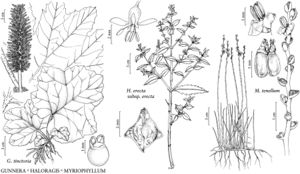Myriophyllum tenellum
Fl. Boston. ed. 2, 346. 1824.
Herbs monoecious, aquatic or semiaquatic, often forming dense mats. Stems unbranched or 1-branched, to 0.7 m. Turions absent. Leaves alternate, homomorphic, scalelike; sessile; submersed leaves ovate, 0.3–1(–1.5) × 0.1–0.7 mm, margins entire; emersed leaves ovate to obovate, (0.5–)0.8–2.5(–3.3) × (0.2–)0.3–1.2(–3) mm, margins entire. Inflorescences to 9 cm; flowers proximally pistillate, medially bisexual, distally staminate; bracteoles cream, narrowly elliptic to ovate, (0.4–)0.5–0.8(–1) × (0.1–)0.2–0.4(–0.5) mm, margins usually entire, sometimes serrate. Staminate flowers: sepals green to cream, lanceolate, 0.1–0.5 × 0.1–0.2 mm; petals persistent, cream to pink, obovate, (0.6–)1–2(–2.3) × (0.3–)0.6–1.4(–1.6) mm; stamens 4, filaments to 1.2 mm, anthers yellow, narrowly elliptic, (0.3–)0.7–1.6 × 0.1–0.5(–0.7) mm. Pistillate flowers: sepals green to cream, lanceolate, 0.1–0.6(–1) × 0.1–0.2(–0.6) mm; petals often persistent, cream to pink, obovate, 0.5–1.7(–2.2) × (0.2–)0.4–1.2(–1.5) mm; pistils to 1.3 mm, stigmas white, to 0.7 mm. Fruits globose, distinctly 4-lobed. Mericarps olive-brown, cylindric to ± globose, 0.6–1.3 × (0.2–)0.4–1.4 mm, transversely ovate, abaxial surface rounded, smooth or minutely papillate, rarely with a single obscure, longitudinal ridge, wings absent. 2n = 14.
Phenology: Flowering and fruiting Jul–Oct.
Habitat: Oligotrophic to mesotrophic waters, lakes, sandy substrates.
Elevation: 0–900 m.
Distribution
St. Pierre and Miquelon, N.B., Nfld. and Labr., N.S., Ont., P.E.I., Que., Conn., Ind., Maine, Md., Mass., Mich., Minn., N.H., N.J., N.Y., N.C., Pa., R.I., Vt., Va., Wis.
Discussion
Myriophyllum tenellum is easily recognized; it is the only water-milfoil in the flora area with homomorphic scalelike leaves whether it is growing submersed or as a shoreline emergent. It is often associated with acidic to circumneutral waters. E. G. Voss (1972–1996, vol. 2) noted that it tends to be overlooked. Although it has been recently recorded from Indiana (R. W. Scribailo and M. S. Alix 2006), we have seen no specimens from Illinois or Ohio.
Selected References
None.
